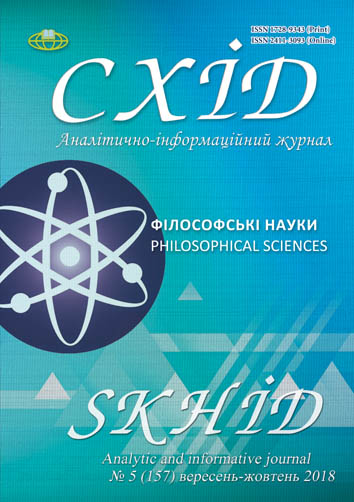Understanding intentionality structure: development of hermeneutics F. Brentano
DOI:
https://doi.org/10.21847/1728-9343.2018.5(157).148633Keywords:
intentionality, hermeneutic, understanding, interpretation, language, internal form of the word, model, sensAbstract
The author of research points out at philosophical heritage of F. Brentano, famous Austrian philosopher and psychologist considered to be founder of phenomenology. In particular, philosophy of language and theory of intentionality are regarded in connection with development of hermeneutic ideas in the context of phenomenological school.
The interaction between this concept and representatives of different linguistic theories of the end of XIX century – the early XX century is shown. The concept of intentionality is presented as key element of process of understanding and interpretation, as criterion of differentiation of mental and physical phenomena, as theoretical and cognitive principle that expresses an orientation to, on the one hand, objective sense of phenomena, and, on the other hand, intention of subject-interpreter.
Intentionality becomes fundamental structure of mind that lies deeper than any concrete, local mental state. From the point of view of Brentano, any psychic act is directed at something, what makes it intentional. Such position had a great influence on development of ideas of modern hermeneutics.
One more vector of development of hermeneutic problematic is described. This vector connects hermeneutic problematic with couple of the most important theories of given period and directly leads to appearance of E. Husserl’s phenomenology that is an origin of modern hermeneutics. Intentionality is examined as initial model that makes sense of hermeneutic interpretation.
Understanding, which is injected in hermeneutic as a basic target, is an isomorphic structure to intentionality. Intentional object with its nature, indifferent to valid existence of a thing, becomes the most important feature of mind and major element of hermeneutic discourse.Downloads
References
Badikov, E.F. 1996. Reinterpretation of subjectivity in the European philosophy of the twentieth century. Scientific notes of the Kazan University. Humanities series. Vol. 134. Book. 3. Kazan University Press, Kazan: 120-128 (rus).
Brentano, F. 1874. Psychologie vom emprisischen Standpunkte, Bd. 1. Verlag von Duncker & Humblot. Leipzig, 1874, 350 s. Available at: https://archive.org/details/psychologievome02brengoog/page/n4.
Brentano, F. 1996. Selected Works. [comp., translat. V. Anashvili]. Dom intellektualnoy knigi, Russian Phenomenological Society, Moscow. 176 p. (rus).
Gromov, R.A. 2004. Anton Marty. The philosophy of the Brentanov school language. Logos, № 1. Available at: http://magazines.russ.ru/logos/2004/1/gr7-pr.html.
Humboldt, W. von. 1985. The nature of the language and the nature of the people [translat]. Language and philosophy of culture. Progress, Moscow: 370-381 (rus).
Husserl, E. 1999. Ideas for pure phenomenology and phenomenological philosophy [translat.]. Dom intellektualnoy knigi, 336 p. (rus)
Karpenko, I.V. 2005. Intentionality of consciousness and genre diversity of philosophy. Humanitarnyi Chasopys. No. 3: 5-10 (rus).
Kraus, O. 1919. Franz Brentano - zur Kenntnis seines Lebens und seiner Lehre. C.H. Beck, München, 171 s. Available at: https://archive.org/stream/franzbrentanozur00krauuoft/franzbrentanozur00krauuoft_djvu.txt
Martynov, K.K. 2007. Intentionality and scientific naturalism. Bulletin of Moscow University. Series 7: Philosophy. № 2: 20-38 (rus).
Meinong, А. [ed.] 1904. Über Gegenstaudstheorie. Untersuchungen zur Gegenstandstheorie und Psychologie. Leipzig, 1904, S. 1-51. Available at: http://www.gleichsatz.de/b-u-t/gene/meinong/standtheorie1.html
Nikonenko, Sergei 2017. Intentionality: an American point of view. HORIZON. 2017. №1 (11). URL: https://cyberleninka.ru/article/n/intentsionalnost-amerikanskaya-tochka-zreniya (дата звернення: 22.09.2018).
Perler, D. 2016. Theory of Intentionality in the Middle Ages [translat.]. Delo, Moscow, 472 pp. (rus).
Downloads
Published
How to Cite
Issue
Section
License
Copyright (c) 2018 Vira Dubinina

This work is licensed under a Creative Commons Attribution-NonCommercial-NoDerivatives 4.0 International License.
1. Authors bear responsibility for the accuracy of facts, quotations, numbers and names used.
2. Manuscripts are not sent back.
3. The publisher does not always agree with the authors' opinion.
4. The authors reserve the right to authorship of the work and pass the first publication right of this work to the journal under the terms of a Creative Commons Attribution-NonCommercial-NoDerivatives 4.0 International License. This license allows others to distribute (copy) the published work for non-commercial purposes, provided there is mandatory attribution to its authors and a link to the first publication in our journal.
5. The authors have the right to conclude separate supplement agreements that relate to non-exclusive work distribution in the form in which it has been published by the journal (for example, to upload the work to the online storage of the journal or publish it as part of a monograph), provided that the reference to the first publication of the work in this journal is included.

